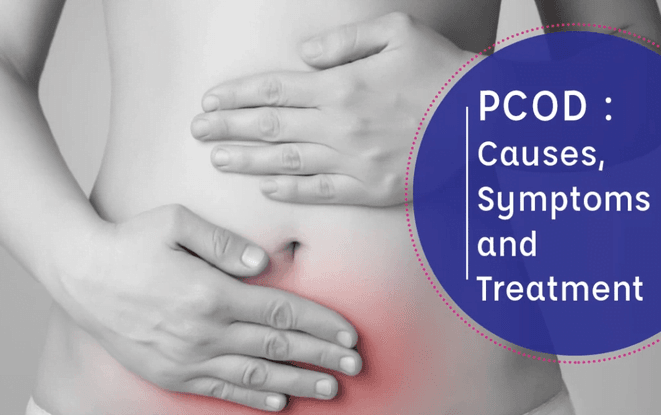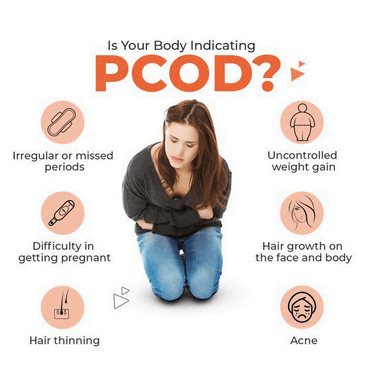
Introduction
PCOD (Polycystic Ovary Syndrome) is a common hormonal disorder that affects people with ovaries. It causes enlarged ovaries with small cysts on the outer edges. The exact cause of PCOD is not known, but it is believed to involve a combination of genetic and environmental factors.
Symptoms of PCOD can vary but often include:
- Irregular periods or no periods at all
- Heavy periods
- Excess body hair, often on the face, chest, or back (hirsutism)
- Acne or oily skin
- Weight gain or difficulty losing weight
- Thinning hair or hair loss from the scalp
- Darkening of the skin, particularly along neck creases, in the groin, and underneath breasts
- Skin tags, which are small excess flaps of skin
PCOD is also associated with an increased risk of developing other health problems, such as insulin resistance, type 2 diabetes, high cholesterol, high blood pressure, and endometrial cancer.
Harmfull effects of PCOD on body

PCOD (Polycystic Ovary Syndrome) can have several harmful effects on a person’s health, both physically and emotionally. Some of the potential harmful effects of PCOD include:
Irregular or Absent Menstrual Periods: PCOD can cause irregular menstrual cycles or even lead to the absence of periods (amenorrhea), which can affect fertility and increase the risk of endometrial cancer.
Infertility: PCOD is one of the leading causes of infertility in people with ovaries. The hormonal imbalances and irregular ovulation associated with PCOD can make it difficult to conceive.
Metabolic Syndrome: PCOD is often associated with metabolic syndrome, which includes conditions like insulin resistance, obesity, high blood pressure, and abnormal cholesterol levels. These factors increase the risk of developing type 2 diabetes and cardiovascular disease.
Gestational Diabetes and Pregnancy Complications: People with PCOD have an increased risk of developing gestational diabetes during pregnancy. They may also be at higher risk for pregnancy complications such as miscarriage, premature birth, and preeclampsia.
Endometrial Cancer: The hormonal imbalances in PCOD can lead to overgrowth of the endometrial lining, increasing the risk of endometrial cancer, especially in people who have irregular periods or no periods for extended periods.
Obesity: Many individuals with PCOD struggle with weight gain or obesity, which can exacerbate hormonal imbalances and increase the risk of other health problems.
Emotional and Psychological Effects: PCOD can impact a person’s mental health, leading to increased stress, anxiety, and depression. The physical symptoms of PCOD, such as acne and excess hair growth, can also have a negative impact on self-esteem and body image.
It’s important for individuals with PCOD to work closely with healthcare providers to manage the condition and reduce the risk of these harmful effects. Treatment typically focuses on managing symptoms, improving hormonal balance, and addressing any underlying metabolic issues. Lifestyle changes such as regular exercise, a healthy diet, and weight management can also play a significant role in managing PCOD and reducing its harmful effects.
Preventions from PCOD
Preventing PCOD (Polycystic Ovary Syndrome) can be challenging because the exact cause is not known, and it often involves a combination of genetic and environmental factors. However, there are some lifestyle changes and strategies that may help reduce the risk or manage the symptoms:
Maintain a Healthy Weight: Being overweight or obese can increase the risk of developing PCOD and worsen its symptoms. Maintaining a healthy weight through a balanced diet and regular exercise may help reduce the risk.
Eat a Balanced Diet: A diet rich in fruits, vegetables, whole grains, and lean proteins can help regulate insulin levels and improve hormone balance, which may help reduce the risk of PCOD.
Exercise Regularly: Regular physical activity can help maintain a healthy weight, improve insulin sensitivity, and regulate hormone levels, all of which can help prevent or manage PCOD.
Manage Stress: Chronic stress can contribute to hormone imbalances, so finding ways to manage stress, such as through yoga, meditation, or other relaxation techniques, may be beneficial.
Avoid Smoking and Limit Alcohol: Smoking and excessive alcohol consumption can disrupt hormone levels and increase the risk of PCOD, so it’s best to avoid or limit these substances.
Get Regular Check-ups: Regular visits to your healthcare provider can help monitor your health and catch any potential issues early.
Consider Birth Control Pills: For some people, taking birth control pills can help regulate menstrual cycles and reduce symptoms of PCOD. However, this should be done under the guidance of a healthcare provider.
Be Mindful of Medications: Some medications, such as steroids and certain antidepressants, can contribute to PCOD symptoms, so it’s important to discuss potential side effects with your healthcare provider.

While these strategies may help reduce the risk of developing PCOD or manage its symptoms, it’s important to remember that PCOD is a complex condition, and individual factors can vary. It’s always best to consult with a healthcare provider for personalized advice and guidance.
Treatment for PCOD typically focuses on managing symptoms. This may include lifestyle changes such as weight loss, regular exercise, and a healthy diet. Medications such as birth control pills, anti-androgen medications, and insulin-sensitizing drugs may also be prescribed to help regulate menstrual cycles, reduce symptoms like acne and excess hair growth, and lower the risk of long-term complications.
Looking for Quick Tips for skin care in summer. Click here
